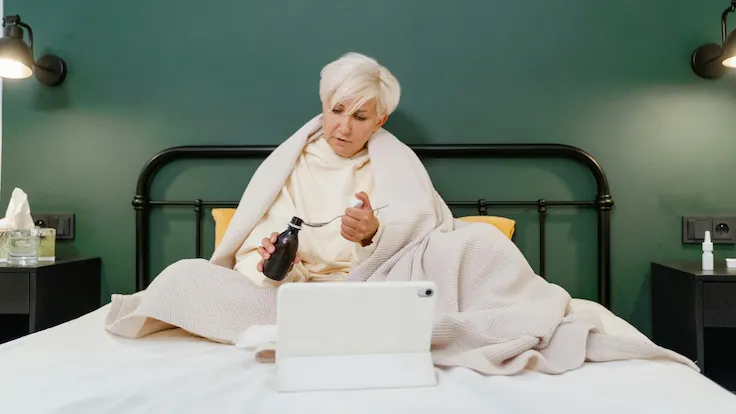Recover from Herpes with Dimer Health once you leave the hospital
Herpes is a viral infection that can cause painful blisters on the skin or mucous membranes. It is important to get great post-acute care after leaving the hospital for herpes because the virus can cause serious complications, such as pneumonia or encephalitis, if it is not properly treated.
Get a personalized care plan and 24x7 clinical support until you fully recover:
Schedule your video call with one of our experienced providers
We will create a personalized core plan and set follow up appointments as needed
You will have 24x7 support for any question via phone, text or web app
We accept most insurances and currently available in New Jersey and New York
How it works
What is Herpes
Herpes is a common viral infection caused by the herpes simplex virus (HSV). There are two types of HSV: HSV-1, which typically causes oral herpes, manifesting as cold sores or fever blisters around the mouth, and HSV-2, which usually leads to genital herpes, characterized by sores around the genital or anal area. However, either type can affect both oral and genital areas. The virus spreads through direct contact with herpes sores or skin where the virus is being shed, often during periods of active symptoms, but it can also spread when there are no visible symptoms.
Once infected, the virus remains in the body for life, residing in nerve cells and occasionally becoming active. During an outbreak, symptoms can include painful blisters or ulcers at the site of infection, itching, and burning sensations during urination. There is no cure for herpes, but antiviral medications can manage outbreaks, reduce the severity and frequency of symptoms, and decrease the risk of transmission to others. Regular use of these medications and practicing safe sex, including the use of condoms, can help manage the spread of herpes and reduce the risk of transmission.
Please call or book an appointment with us if you think you have Herpes or are recovering from it
Herpes Recovery Tips
Recovering from herpes treatment after a hospital discharge involves managing symptoms and preventing future outbreaks. Here are several tips to help you recover and maintain your health:
Please call or book an appointment with us if you think you have Herpes or are recovering from it
- Take Medication as Prescribed: If you’ve been prescribed antiviral medications to manage herpes, it’s crucial to take them exactly as directed by your doctor. This can help reduce the severity and duration of outbreaks.
- Manage Pain and Discomfort: Over-the-counter pain relievers such as ibuprofen or acetaminophen can help alleviate the pain associated with herpes outbreaks. For local symptom relief, cool compresses or soothing baths can also be beneficial.
- Keep Affected Areas Clean and Dry: Gently washing the affected areas with mild soap and water and keeping them dry can help prevent additional infections and aid in the healing process.
- Avoid Irritating the Affected Areas: Wear loose, breathable clothing and avoid tight garments that might irritate sores or lesions.
- Stay Hydrated: Drinking plenty of fluids can help your body maintain its functions and speed up recovery.
- Manage Stress: Stress can trigger herpes outbreaks, so it’s important to engage in stress-reduction activities such as yoga, meditation, or deep-breathing exercises.
- Get Plenty of Rest: Rest is crucial for your immune system to fight off the virus and recover from outbreaks effectively.
- Avoid Sexual Contact During Outbreaks: To prevent spreading the virus to your partner, abstain from sexual contact whenever you have symptoms or an outbreak.
- Discuss With Your Partner: It’s important to communicate with your partner about your condition. Discussing the risks, preventive measures, and the implications of herpes can help manage the condition together.
- Follow-Up Appointments: Keep any follow-up appointments with your healthcare provider to monitor your condition and adjust your treatment plan if needed.
Following these tips can help you manage your symptoms more effectively and prevent future herpes outbreaks, allowing you to maintain a healthier lifestyle.
Don't navigate your recovery journey alone.
Let us be there for you every step of the way.


